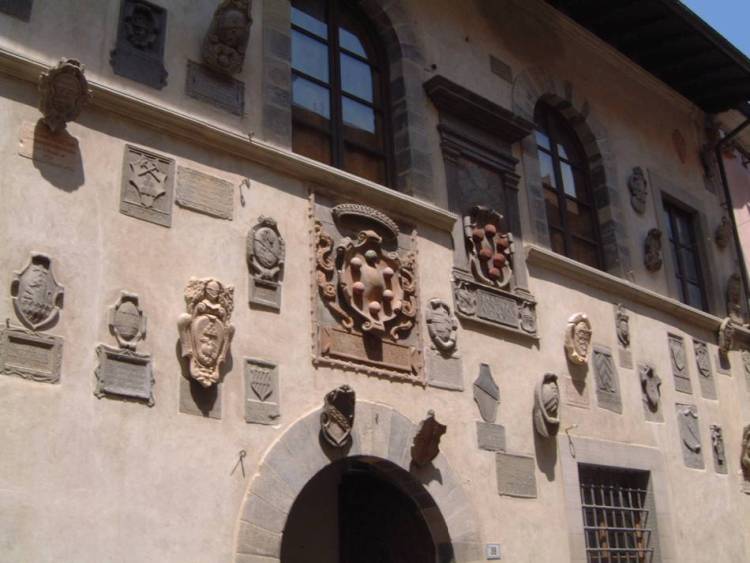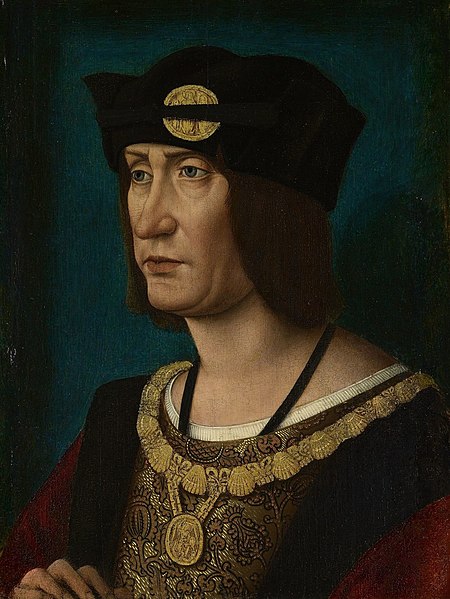 |
| assumed to be a portrait of Giovanni il Popolani de' Medici |
Assault from Venice
In the
spring of 1498, while his mother was in the latter stages of her pregnancy,
Ottaviano organised a carnival with dances, banquets and parties. His
half-brother Ludovico was born on 6th April 1498
in Ravaldino. He was named after his great uncle of Milan in an attempt to
foster better relations between the two city states but the Milanese ambassador
did not attend Ludovico’s christening.
In May 1498
Savonarola was executed following criticism of the pope. The summer saw
Ottaviano depart with his mercenaries for a stint in Pisa. He was accompanied
by his stepfather Giovanni. Venice turned its wrath on Caterina and the Riario
lands were subject to continued incursions by Venetian troops. Aware that she
was likely to be besieged by the Venetians Caterina informed her uncle;
‘When Venice attacks, I will
have enough spirit to defend myself….If I must lose because I am a woman, I
want to lose like a man.’[i]
 |
| Palazzo di Capitani at Bagno di Romagna showing de' Medici coat of arms |
Giovanni was
plagued with gout and he suffered a severe attack following his return from
Pisa. After a week with Caterina in Forli, Giovanni left for the thermal baths
at Bagno di Romagna on 28th August.
Caterina’s daughter Bianca, who was also unwell, travelled with him. On 11th
September Caterina was summonsed to Bagno and Giovanni died in her arms on the
12th September 1498.
Giovanni’s
body was claimed by his brother and taken back to Florence for his funeral.
Caterina returned to Forli draped in black once again, a widow for the third
time. The Venetians attacked the city at the end of the month, using tactics
that Caterina had already foreseen and made arrangements to foil.
Preparing for the Worst
 |
| Lucrezia Borgia |
In 1499
Caterina recklessly turned down an offer of marriage for Ottaviano; the pope proposed
that Ottaviano marry his only daughter Lucrezia. Caterina turned the offer down; Lucrezia had already been
married to Caterina’s cousin Giovanni and the marriage had been annulled after three years on the
grounds of his alleged impotency. This refusal made Caterina a whole host of
new enemies in the fiercely tribal Borgia family.
The pope was
intent on bringing the Romagna under papal control and Alexander’s blunt
instrument was his son Cesare. Cesare held the post of Captain-General of the
Papal Army once held by Girolamo Riario. But Cesare was far more dangerous than
Girolamo had ever been[ii].
In May
Alexander issued a papal bull in which he called Caterina ‘a daughter of iniquity’. Citing three
years’ worth of unpaid tribute and tyranny on Caterina’s part Alexander deposed
Ottaviano’s lordship of Forli in favour of Cesare. Caterina sent an envoy to
Rome, empowered to offer immediate payment of 3,600 ducats[iii]
owing. Alexander held the whip-hand and refused to meet with Caterina’s
emissary.
 |
| Lorenzo il Popolani de' Medici |
In midsummer
little Ludovico fell ill and Caterina spent much of her time at his bedside.
When Ludovico recovered she wrote to Giovanni’s brother Lorenzo;
He has recovered enough that
if nothing else happens, we hope that he may be cured of this illness. Thank
God for everything.’[iv]
In August
the plague hit Forli and 179 people died before the outbreak burnt itself out.
When
Ludovico had recovered sufficiently Caterina started teaching him to ride. She
was also concerned about her son’s inheritance. Giovanni had been a wealthy man
and Caterina now proclaimed her marriage before a notary. This attempt was in
vain as Lorenzo merely absorbed his brother’s fortune into his own, leaving
Caterina with no other alternative but to take her brother-in-law to court, a
process that was to last many years
Taking Forli
 |
| Louis XII |
On 9th
November 1499 Cesare Borgia left Milan at the head of the combined papal and
French troops. When appealed to by Caterina for support, Louis XII[v] informed her that he could not
interfere in papal matters. Florence, afraid of retaliation from Rome, was
unable to assist and Caterina found herself standing alone against the joint
Franco-papal army. Caterina’s agent at Louis’ court wrote to her;
‘Everyone is waiting for
your undoing and ruin, most of all Rome, from whence comes all this evil.’[vi]
To further
isolate Caterina, Alexander even took the step of writing to the Signoria in Florence accusing Caterina
of trying to poison him.
The land
around Forli was razed, all trees and buildings within a quarter of a mile to
Forli’s walls being taken down. Each major house in the city was stocked with
four month’s supply of food. Caterina had ordered modern artillery and the
walls of Ravaldino had been improved and strengthened to cope with the pounding
of the French artillery.
With the
arrival of Cesare Borgia in December the elders of Forli suggested that
Caterina take a leaf from her uncle’s book and depart in the night. Caterina
had already sent her children to the safety of Florence. On 14th
December, unwilling to risk the destruction of the town for Caterina’s sake,
two of Caterina’s supporters abandoned her and offered the town’s submission to
Cesare Borgia in Imola[vii].
On the 19th Cesare rode into Forli and stationed himself and his men
outside the walls of Ravaldino.
A Borgia Kidnapping
 |
| Cesare Borgia |
On 26th
December Caterina strode out onto the ramparts of Ravaldino to defend her
eldest son’s fief. She wore a specially made cuirass. In the square below the fortress Cesare Borgia awaited her; he bowed
and informed her that if she surrendered his father would bestow another
stronghold on her. Cesare offered compensation, land, money[viii]
and a house in Rome. In response Caterina informed him;
‘All of Italy knows the
worth of the Borgia word. The bad faith of the father has removed any credit
from the son.’[ix]
Caterina
informed Cesare that the Holy Roman Emperor’s troops were due to arrive any
time now. A further attempt at parley saw Cesare almost trapped in Ravaldino.
Cesare’s artillery was fired at the fortress and on 12th January a
sizeable hole in the walls allowed Cesare’s troops to pour into Ravaldino.
Caterina
attempted to commit suicide by blowing up her gunpowder magazine, the attempt
failed due to a defective fuse. Caterina was taken prisoner by the French and
Cesare had to pay the leader of the French forces 4,000 ducats[x]
to hand Caterina over.
 |
| Cesena |
On 14th
January the news arrived in Rome that;
‘The fortress of Forli;
together with Countess Caterina Sforza….had been treacherously and violently
captured by Don Cesare Borgia, and that everyone else there had been put to the
sword.’[xi]
Cesare now turned
his attention to the Sforza city of Pesaro[xii] while the French were diverted north
to Milan by the arrival of Ludovico Sforza with 8,000 Swiss and 500 Burgundian
troops, in an attempt to seize back control of his duchy.
‘There is news that the lady
of Forli has been sent to Cesena,
and it seems that Duke Valentino [Cesare] has gone there, and, as I hear, was
keeping the said lady, who is the most woman….day and night in his room, with
whom, in the opinion of all, he is taking his pleasure.’[xiii]
Bibliography
At the Court
of the Borgia – Johann Burchard, the Folio Society 1990
Lucrezia Borgia – Rachel Erlanger, Michael Joseph 1979
The Deadly
Sisterhood – Leonie Frieda, Harper Collins 2013
Florence and
the Medici – JR Hale, Phoenix Press 2004
The Rise and
Fall of the Medici – Christopher Hibbert, Folio Society 2001
The Borgias
– Mary Hollingsworth, Quercus Editions Ltd 2014
Tigress of
Forli – Elizabeth Lev, Head of Zeus Ltd, 2012
The Borgias
– GJ Meyer, Bantam Books 2013
Absolute
Monarchs – John Julius Norwich, Random House 2011
Niccolo’s
Smile – Maurizio Viroli, IB Tauris & Co Ltd 2001
www.wikipedia.en
[i]
Tigress of Forli - Lev
[iii]
In 2016 the relative: historic standard of
living
value of that income or wealth is £2,599,000.00, labour earnings of that income or wealth is
£21,250,000.00, economic status value of that income or wealth is £60,850,000.00, economic power value of that income or
wealth is £1,425,000,000.00 www.measuringworth.com
[iv]
Tigress of Forli - Lev
[v]
Louis XII had invaded Italy and taken Milan, deposing Ludovico Sforza who fled
for sanctuary with the Holy Roman Emperor – see http://wolfgang20.blogspot.co.uk/2015/10/renaissance-france-anne-of-brittany-v.html
[vi]
Tigress of Forli - Lev
[vii]
The town and Caterina’s castellan surrendered to the Franco-papal army and
Caterina’s castellan joined forces with them to attack Forli
[viii]
An annuity of 4,000 ducats a year - in 2016 the relative: historic standard of
living value of that income or
wealth is £7,219,000.00, labour earnings of
that income or wealth is £59,030,000.00, economic status value of that income or wealth is £169,000,000.00, economic power value of that income or wealth is £3,958,000,000.00 www.measuringworth.com
[ix]
Tigress of Forli - Lev
[x]
See note viii above
[xi]
At the Court of the Borgia - Burchard
[xii]
Giovanni Sforza fled the city and did not return until after both the pope and
Cesare were dead
[xiii] The Deadly Sisterhood - Frieda
No comments:
Post a Comment
Note: only a member of this blog may post a comment.